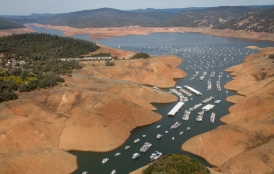The Stanford School of Earth, Energy & Environmental Sciences is now part of the Stanford Doerr School of Sustainability.
This page is currently being maintained for archival purposes only. For the latest information, please visit us here.
Stanford experts weigh in on the impact and influence of California’s ambitious global warming legislation
The new bill SB 32 will extend and expand targets for emissions cuts, putting the Golden State at the forefront of global efforts to lessen and adapt to impacts of climate change. However, questions remain about the legality of the state’s cap and trade program, a central mechanism for reaching targets.
By
Rob Jordan
September 1, 2016

El Segundo Chevron oil refinery in Los Angeles. California’s oil and gas industry faces major changes under the state’s ambitious climate change targets. (Image credit: Pedro Szekely / Flickr)
California Gov. Jerry Brown is expected to sign into law a bill (SB 32) that significantly increases the state’s ambitious targets for greenhouse gas emission reductions. The bill extends the reach of an earlier law (AB 32) from 2020 to 2030, and calls for cutting over eight times more carbon emissions.
The state’s cap and trade program – the primary mechanism for ensuring emissions reductions – has brought hundreds of millions of dollars to projects ranging from energy efficiency initiatives to rebates for zero-emission vehicles. Opponents argue that cap and trade is a tax that requires a two-thirds vote to approve, as per state law. But that seems unlikely, given that SB 32 passed the state assembly by a vote of 42 to 29, with only one Republican signing on.
To better understand the influence and impact of California’s landmark climate change legislation, Stanford Report spoke with climate and energy policy experts Chris Field, the Melvin and Joan Lane Professor for Interdisciplinary Environmental Studies and a professor in the School of Earth, Energy & Environmental Sciences; James Sweeney, a professor of management science and engineering; and Michael Wara, an associate professor of law.
Can you explain the significance of California’s climate legislation to the average person here in the U.S., as well as in a global context?
Michael Wara: “California is trying to reinvent modern, industrialized society. It’s a new way to create a productive economy that generates jobs and is sustainable. That’s going to be something people really want to copy in places like China and elsewhere. Setting the example and showing how it’s done is almost more important than hitting those targets.”
James Sweeney: “AB 32 has led to stronger energy efficiency standards on buildings and requirements on utilities to increase the fraction of electricity generated by wind and solar power. SB 32 may require laws aimed at forcing purchases of electric vehicles, and it will require larger fractions of wind and solar. It is likely to increase electricity prices.”
What was the impact of AB 32 when it passed in 2006 versus over the decade since? How does it relate to international targets set at the Paris climate talks?
Chris Field: “California’s leadership on addressing climate change has played a strong role in building recognition for the importance of actors other than national governments and for structuring the Paris Agreement as a way to embrace collaborations among nations, states, communities and companies.”
What does the recent low demand for emissions credits mean for the future of the state’s cap and trade program? Is the market working? Has the advancement of technology, energy efficiency and renewable energy made the market less relevant or important?
Sweeney: “The recent low demand is likely the result of a question as to whether the cap and trade program will be continued beyond the expiration of AB 32. As in any market with storable commodities – in this case, credits – expectations of future conditions are very important for current prices.”
SB 32 does not specify the means by which targets should be met. What does that mean for the future of cap and trade in the state? How will this impact other states, countries and nonstate actors influenced by California’s climate policy experience?
Field: “SB 32 is important in setting a clear goal. There is definitely more work to do in determining the mix of market and regulatory mechanisms that will let us reach that goal. California is ahead of the game as a result of experience with AB 32, but there are many new aspects to meeting the challenge of climate change.”
What are the most pressing legal concerns and/or potential obstacles at play?
Wara: “California’s Air Resources Board [ARB] needs to explain the authority it has to extend the cap and trade program. If it can’t, it will face a lawsuit. ARB will likely argue AB 32 empowers it to use the most cost-effective means to achieve these targets. But AB 32 also says it only has until 2020 to use a market-based mechanism like cap and trade.”
Field is the Perry L. McCarty Director of the Stanford Woods Institute for the Environment and a senior fellow at the Precourt Institute for Energy. He is a world authority on global climate change impacts and adaptation, and was co-chair of Working Group II of the Intergovernmental Panel on Climate Change from 2008 to 2015. Sweeney is director of the Precourt Energy Efficiency Center and a senior fellow at the Stanford Institute for Economic Policy Research. He is an expert on energy efficiency and energy economic policy, and was appointed to serve on the Economic and Allocation Advisory Committee, which advised the implementation of AB 32. Wara is an expert on domestic and international climate policy and regulation whose work has focused on California’s cap and trade program and the efficacy of state and federal climate regulations.







